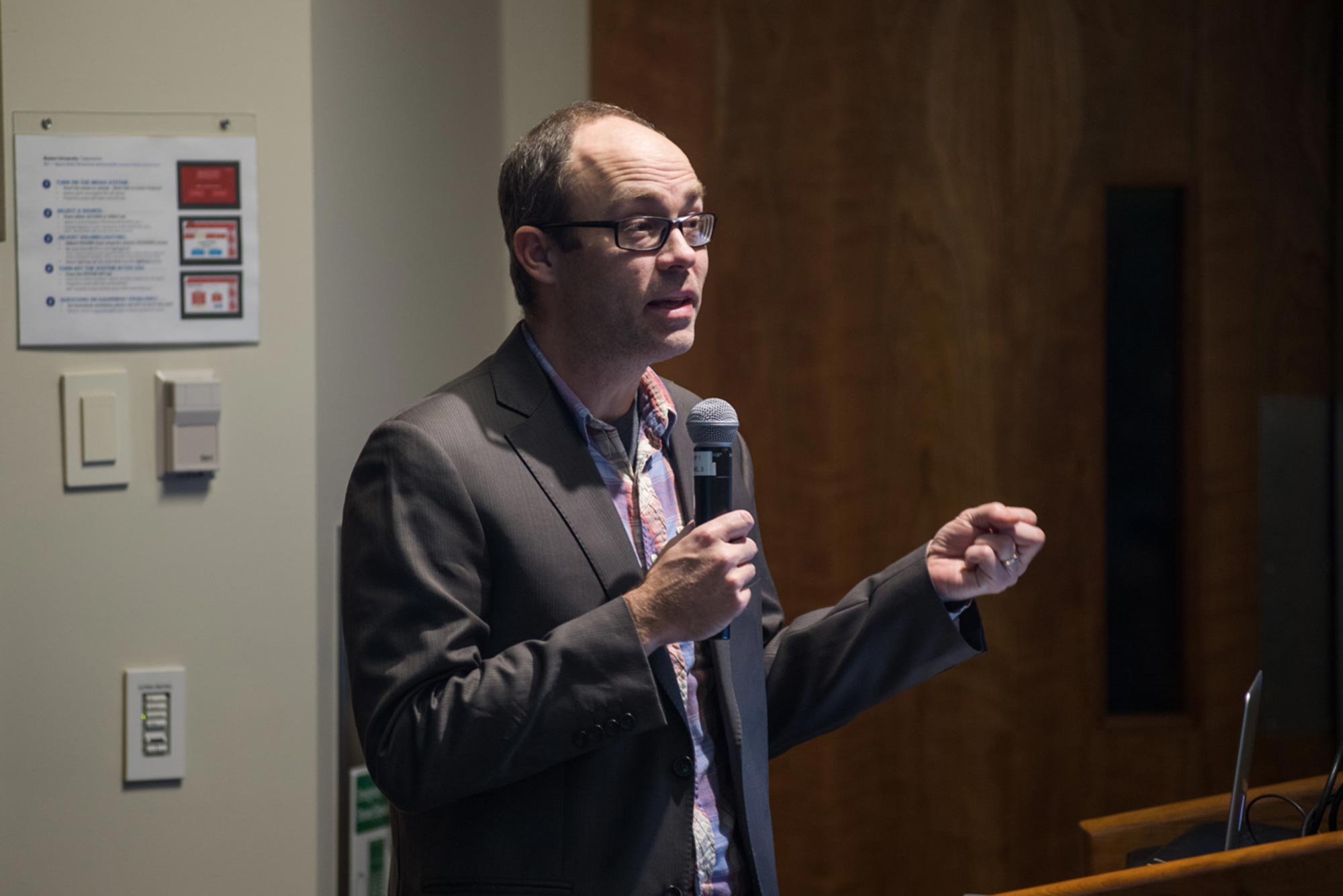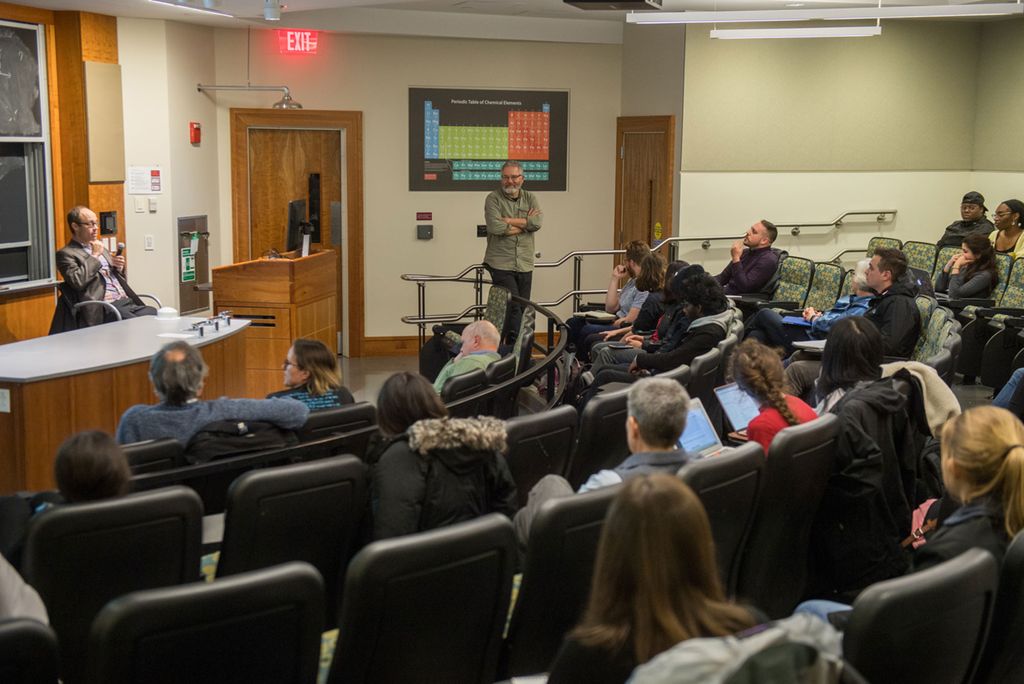A Response to Ben Shapiro’s Talk at BU Last Month

Spencer Piston, a College of Arts & Sciences assistant professor of political science, delivered a lecture titled Who Built America? A Response to Ben Shapiro at the Metcalf Science Center Monday night.
A Response to Ben Shapiro’s Talk at BU Last Month
CAS political science professor’s lecture takes on issues of slavery, free speech
It was a smaller crowd, in a smaller venue, than conservative commentator Ben Shapiro’s heated event at BU last month, but the focus of Spencer Piston’s talk Monday evening covered the same topic: was America built upon slavery or was it built upon freedom?
After Piston, a College of Arts & Sciences assistant professor of political science, finished his hour-long lecture, the students and faculty who attended—black, white, Latino, Asian, conservative, and liberal—debated respectfully with one another for the next hour, with Piston as unofficial moderator. And after it ended, people stayed even longer to continue the conversation.
The event was in a Metcalf Science Center classroom (with the Periodic Table of Chemical Elements on the wall as an odd backdrop) before about 50 people, mostly students. It was a striking contrast to Shapiro’s November 13 talk, which was held amid tight security at the Track & Tennis Center, with protesters outside and 1,500 people inside. Another difference between the events: Shapiro was invited to campus by a student group, the BU chapter of Young Americans for Freedom (YAF); Piston was asked to speak in response to Shapiro’s talk by the Elie Wiesel Center for Jewish Studies because of his expertise on race in American politics.
In introducing Piston, Michael Zank, a CAS professor of religion and of Jewish studies and director of the Elie Wiesel Center, said that the title of Shapiro’s talk—America Was Not Built on Slavery, It Was Built on Freedom—was about provocation, not fact. Zank said the premise of that title was nonsense.
“It just makes no sense,” Zank said, and “it victimizes anyone who cares about what’s real.”
At the start of his talk, Piston emphasized that he would not attack Shapiro and acknowledged that he had not attended the conservative commentator’s speech. But playing off the title of Shapiro’s talk, Piston took umbrage with the premise of Shapiro’s argument, calling his own lecture Who Built America? A Response to Ben Shapiro. (In addition to the Elie Wiesel Center, the BU African American Studies Program and holocaust, genocide, and human rights studies faculty sponsored the Monday night event.)
“Slavery isn’t something that happened,” Piston said in his talk. “It’s something that people did.” He also criticized University leadership for distancing itself from Shapiro’s talk by claiming that it was a student-organized event, but then paying thousands of dollars in security costs to ensure that it could happen. “Shapiro’s ideas were expressed on this campus to more than 1,000 people because of resources,” he said. “And resources have power.”

That last comment seemed to resonate with his audience, with some expressing frustration that Piston had not challenged Shapiro’s talking points about racism more aggressively, and others welcoming his more nuanced perspective and criticisms of the University for how it handled Shapiro’s talk. The students fired off questions rapidly and anonymously, and Piston did his best to keep the dialogue moving.
“Is there a way for students to incorporate themselves into the power structure at BU or to use their power to more properly have the administration represent our views?” asked one student, who admitted he had heckled Shapiro at his November talk.
A female student said she was disturbed that BU had not only paid to cover security for the Shapiro event, but that police with guns were present there. “That can be a very triggering situation for students of color,” she said.
A former member of the BU YAF chapter defended Shapiro, saying anyone who thinks he supports white supremacist views is misguided. “Ben Shapiro is not racist,” he said, as others in the audience shook their heads in disagreement.
Last month’s appearance by Shapiro, the editor-in-chief of the far-right Daily Wire news website, a former editor at Breitbart, and host of The Ben Shapiro Show podcast, sparked a heated conversation across BU in advance of his talk and after it. And in the hours just prior to his appearance, more than 200 students marched in silent protest up Commonwealth Avenue, carrying signs that said, “Hate speech ≠ free speech” and “Racism kills.”
Shapiro’s own words did little to calm emotions that evening. In talking mainly about Civil War history, he dismissed the idea that “every single problem in America today is based on slavery,” by asking, “Are teens in Chicago today killing each other at rapid rates because of slavery?”
And on that theme, he insisted: “Freedom is what makes America unique, not slavery.” Barack Obama’s presidency, he said, proves that America is “one of the least racist multiracial countries today.”
But the majority of students at Piston’s talk said it seemed as if the University felt obligated to allow Shapiro to come—and it should not have.
“One of the big issues that the group that invited Ben Shapiro here said is that they want students to engage in ideas that differ with their own, which I think is very valid,” one student said. “But why does that mean we have to bring someone like him to campus, who we know spews hate speech, and it takes money away from other groups so that we can pay for their security…. How do we engage with the ideas that are prevalent, that are important to engage, without actually inviting these figures to campus. How do we work with the administration to do that?”
Piston did not have a solution to her question. “I think that’s a great point,” he said. “And I do think that’s the first step.”


Comments & Discussion
Boston University moderates comments to facilitate an informed, substantive, civil conversation. Abusive, profane, self-promotional, misleading, incoherent or off-topic comments will be rejected. Moderators are staffed during regular business hours (EST) and can only accept comments written in English. Statistics or facts must include a citation or a link to the citation.